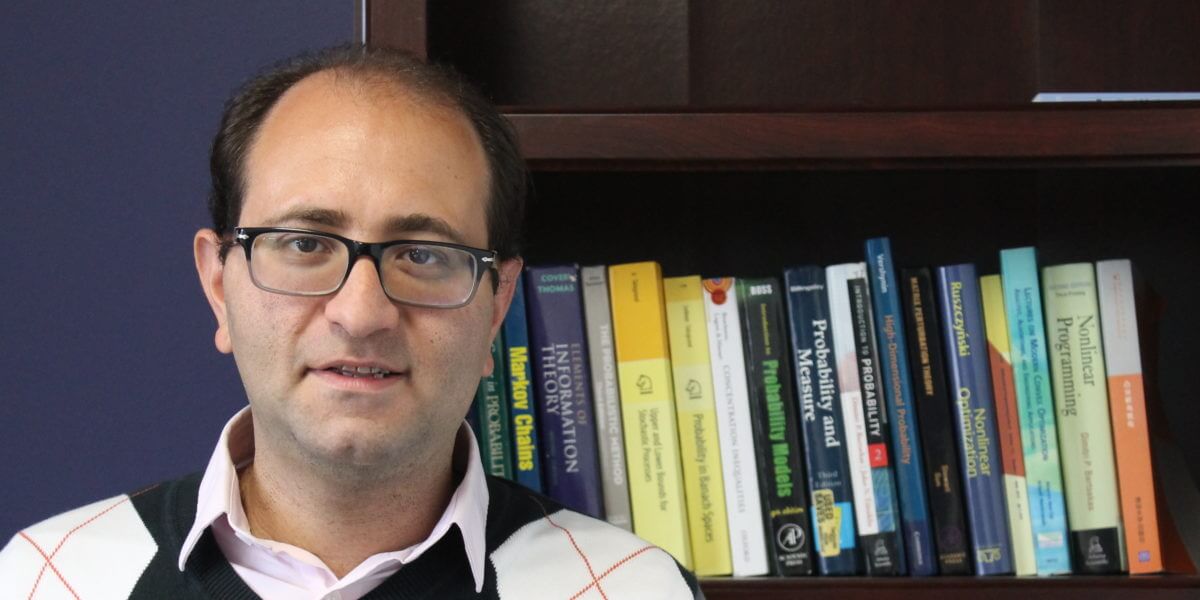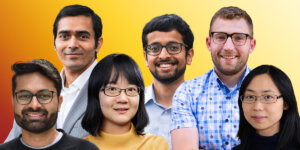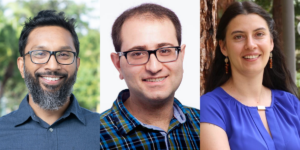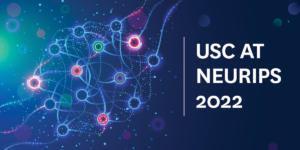
Mahdi Soltanolkotabi’s work with computation algorithms has won him four major honors in the past year. (PHOTO CREDIT: USC Viterbi)
It’s only February but Mahdi Soltanolkotabi, the Andrew and Erna Viterbi Early Career Chair in the Ming Hsieh Department of Electrical and Computer Engineering is having a good year. A very good year. His work is changing some of the most important technologies of our time. But before getting into that, it would downright irresponsible not mention just how much he’s been winning. Earlier this month, Soltanolkotabi was named a 2019 Sloan Research Fellow – joining just 128 other early-career researchers in the country. Last month he won an NSF CAREER Award. Just a few months before that he walked away with a Packard Fellowship (one of only 18 in all disciplines of science and engineering). And just a few months before that he won an Air Force Young Investigator Award. So, what is it about his work that is so important?
Well, in case you weren’t already concerned about the direction we’re going in with Artificial Intelligence before, Soltanolkotabi has more for you to think about. “In Modern AI, we use a lot of heuristic algorithms to make things work,” he says. “But we have no idea WHY these algorithms work when they do or, for that matter, why they fail when they don’t!” In simpler times, when we were using machine learning and AI for things like generating ad revenue on the internet, a misunderstood algorithm might, at worst, mean a loss of money. But today, AI is at the center of all kinds of human-focused technologies like self-driving cars, machine learning, and medical diagnostics. We simply cannot accept algorithms with this level of influence over our lives that we do not understand completely.
“In Modern AI, we use a lot of heuristic algorithms to make things work, but we have no idea WHY these algorithms work when they do or, for that matter, why they fail when they don’t!”
So, one thing Soltanolkotabi is working on is new, better algorithms to address the needs of our modern technological world in the most human way possible. Essentially, he’s trying to get algorithms to operate as efficiently, reliably and safely as he can. But designing new algorithms is just half of it.
This may seem like an irrelevant question, but have you ever been to one of those played out 80’s or 90’s parties? You know the kind: everyone is celebrating the highlights of a long-past decade. Some song that brings you back to senior year of high school is playing in the background. You dig deep into your closet to find a shirt you haven’t worn in a decade with the appropriate cultural reference printed on the front. Well, that’s kind of like the other aspect of Soltanolkotabi’s work: throwing a 90’s party for algorithms.
You see, back in the 90’s, there were a lot of AI algorithms that were really trendy for some cool stuff they could do. These trendy algorithms were interesting but unfortunately, the world they were created in wasn’t ready for what they could do. Much like how some musicians, years after their death, are rediscovered and bemoaned for being “ahead of their time,” the technology didn’t exist for these algorithms to be appreciated. Today, with more powerful computers and larger data sets than ever before, these algorithms are beginning to transform almost all aspects of science, engineering, and technology. However, along with success stories, news of failure is also increasingly common. Our lack of understanding of these algorithms and how they operate makes them particularly dangerous for deployment in human-facing services. This could lead to catastrophic consequences – some of which we are not even aware of. Soltanolkotabi is making sure these algorithms are safe and reliable by understanding them, perfecting them, and avoiding their failure modes.
It may sound counterintuitive, but Soltanolkotabi’s algorithms are ensuring that our world, even in the face of these changes, remains a world with humanity.
For a professor in the department of Electrical and Computer Engineering, Soltanolkotabi’s work sounds a lot like what would go on in the Mathematics department – a fact he is well aware of. “Electrical Engineering, to me, is really about so many things,” said Soltanolkotabi. “Many aspects of electrical engineering has to do with preparing and understanding the data and signals we gather from various sources and devices.”
Yes, Soltanolkotabi’s work is groundbreaking, and yes, it is changing the way we use a wide variety of tools and technologies. But for all the talk of algorithms and maximum efficiency points, the excitement over his work comes down to one thing: people. Technologies like AI and automation are changing our world in real ways that we do not yet fully understand. It may sound counterintuitive, but Soltanolkotabi’s algorithms are ensuring that our world, even in the face of these changes, remains a world with humanity. Now that’s something worth celebrating.
Published on February 27th, 2019
Last updated on September 16th, 2020











